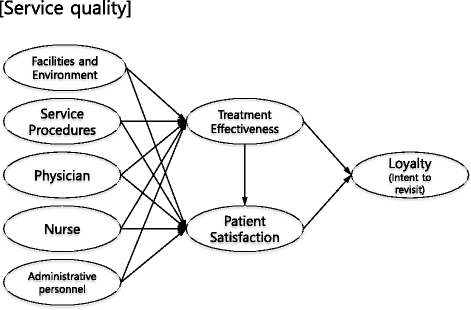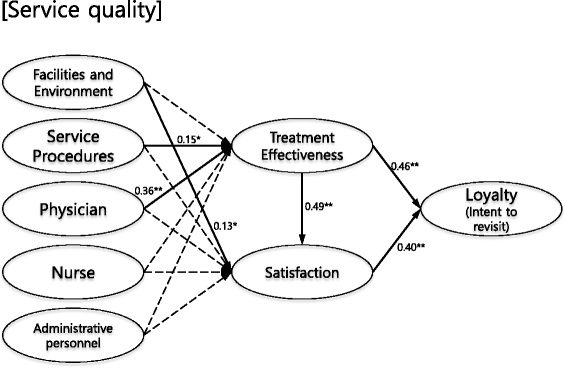Quality of medical service, patient satisfaction and loyalty with a focus on interpersonal-based medical service encounters and treatment effectiveness: a cross-sectional multicenter study of complementary and alternative medicine (CAM) hospitals
- PMID: 28351389
- PMCID: PMC5370429
- DOI: 10.1186/s12906-017-1691-6
Quality of medical service, patient satisfaction and loyalty with a focus on interpersonal-based medical service encounters and treatment effectiveness: a cross-sectional multicenter study of complementary and alternative medicine (CAM) hospitals
Abstract
Background: Treatment effectiveness holds considerable importance in the association between service quality and satisfaction in medical service studies. While complementary and alternative medicine (CAM) use grows more prominent, comprehensive evaluations of the quality of medical service at CAM-oriented hospitals are scarce. This study assesses the quality of medical services provided at a CAM-oriented hospital of Korean medicine using the service encounter system approach and analyzes the influence of treatment effectiveness on patient loyalty.
Methods: A survey study using one-on-one interviews was conducted using a cross-sectional design in outpatients visiting one of fifteen Korean medicine facilities located throughout Korea. A total of 880 surveys were completed from June to July, 2014, and 728 surveys were included in the final analysis after excluding incomplete or incorrect questionnaires. The reliability and validity of the surveys was confirmed using Cronbach's alpha coefficient and confirmatory factor analysis, and a structural equation modeling analysis was performed to verify causality and association between factors (quality of medical service, treatment effectiveness, patient satisfaction, and intent to revisit).
Results: The measured factors of physician performance and quality of service procedures had a positive effect on treatment effectiveness. The impression of the facilities and environment directly impacted satisfaction rates for interpersonal-based medical service encounters, while treatment effectiveness positively affected satisfaction regarding quality of medical service. However, treatment effectiveness had a more significant effect on satisfaction compared to facilities and environment, and it indirectly affected satisfaction and directly influenced intent to revisit. Treatment effectiveness and satisfaction both positively influenced intent to revisit.
Conclusions: The importance of treatment effectiveness should be recognized when examining quality of medical services, and we hope that these findings may contribute to future studies.
Keywords: Health care facilities, manpower, and services; Health care quality, access, and evaluation; Health personnel; Health services; Patient satisfaction; Surveys and questionnaires; Treatment outcome.
Figures


Similar articles
-
Examining Soft and Hard Attributes of Health Care Service Quality and Their Impacts on Patient Satisfaction and Loyalty.Qual Manag Health Care. 2024 Jul-Sep 01;33(3):176-191. doi: 10.1097/QMH.0000000000000420. Epub 2024 Jun 26. Qual Manag Health Care. 2024. PMID: 37482638
-
Medical service quality, patient satisfaction and intent to revisit: Case study of public hub hospitals in the Republic of Korea.PLoS One. 2021 Jun 28;16(6):e0252241. doi: 10.1371/journal.pone.0252241. eCollection 2021. PLoS One. 2021. PMID: 34181662 Free PMC article.
-
Service quality, trust, and patient satisfaction in interpersonal-based medical service encounters.BMC Health Serv Res. 2013 Jan 16;13:22. doi: 10.1186/1472-6963-13-22. BMC Health Serv Res. 2013. PMID: 23320786 Free PMC article.
-
The Effects of Korean Medical Service Quality and Satisfaction on Revisit Intention of the United Arab Emirates Government Sponsored Patients.Asian Nurs Res (Korean Soc Nurs Sci). 2017 Jun;11(2):142-149. doi: 10.1016/j.anr.2017.05.008. Epub 2017 Jun 27. Asian Nurs Res (Korean Soc Nurs Sci). 2017. PMID: 28688500
-
Exploring the Relationship Between Hospital Service Quality, Patient Trust, and Loyalty From a Service Encounter Perspective in Elderly With Chronic Diseases.Front Public Health. 2022 May 25;10:876266. doi: 10.3389/fpubh.2022.876266. eCollection 2022. Front Public Health. 2022. PMID: 35692341 Free PMC article. Review.
Cited by
-
Medical service quality evaluation based on LDA and sentiment analysis: Examples of seven chronic diseases.Digit Health. 2024 Mar 6;10:20552076241233864. doi: 10.1177/20552076241233864. eCollection 2024 Jan-Dec. Digit Health. 2024. PMID: 38465296 Free PMC article.
-
Medical service quality, psychological contract, and patient loyalty: An empirical study among patients in China.Medicine (Baltimore). 2020 Nov 25;99(48):e21079. doi: 10.1097/MD.0000000000021079. Medicine (Baltimore). 2020. PMID: 33235054 Free PMC article.
-
Strategies to improve patient loyalty and medication adherence in Syrian healthcare setting: The mediating role of patient satisfaction.PLoS One. 2022 Nov 18;17(11):e0272057. doi: 10.1371/journal.pone.0272057. eCollection 2022. PLoS One. 2022. PMID: 36399483 Free PMC article.
-
Topics most predictive of favorable overall assessment in outpatient radiology.PLoS One. 2023 May 3;18(5):e0285288. doi: 10.1371/journal.pone.0285288. eCollection 2023. PLoS One. 2023. PMID: 37134069 Free PMC article.
-
The influence of healthcare service quality on patients' satisfaction in urban areas: The case of Pakistan.Heliyon. 2024 Sep 12;10(18):e37506. doi: 10.1016/j.heliyon.2024.e37506. eCollection 2024 Sep 30. Heliyon. 2024. PMID: 39323768 Free PMC article.
References
-
- Lewis RC, Booms B. The marketing aspects of service quality. In: AMA proceedings. Chicago: American Marketing Association; 1983. p. 99–104.
-
- Oliver RL, Balakrishnan PVS, Barry B. Outcome satisfaction in negotiation: a test of expectancy disconfirmation. Organ Behav Hum Decis Process. 1994;60(2):252–275. doi: 10.1006/obhd.1994.1083. - DOI
Publication types
MeSH terms
LinkOut - more resources
Full Text Sources
Other Literature Sources
Medical

